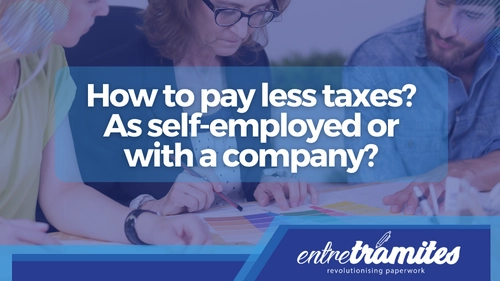There are frequent queries from professionals who pay their IRPF (Personal Income Tax) as self-employed and are considering the possibility of paying it as a limited company (known as “Sociedad Limitada” in Spain). Their main doubt is if it is more convenient for them to tax as self-employed or company.
The tax bill in the IRPF is much higher than in the corporate tax from a certain scale of income, so deciding on one form of taxation or another is the eternal question for many self-employed workers who can choose between the Personal Income Tax (IRPF) or corporate tax.
Before getting into the comparisons, we must be clear that the professional who considers this possibility can decide by themself what they want to do. But an employee of a company with a high salary will not have this option since their earnings from work are exactly that, the income they get from working and that cannot be changed. On the other hand, a designer, a journalist, and other professionals can consider this option.
Self-employed or Company? The balance point between income and companies
For corporate tax, net profits are taxed at a fixed rate of 25%. This percentage of 25% is applied as a general rule and we apply it at that level without considering the cases in which we can reduce this tax rate through some deduction.
Given that the Personal Income Tax is taxed progressively and personal and family circumstances are taken into account, we must determine from what interval the taxation in the company tax can be considered.
The Personal Income Tax (IRPF) tax rates are as follows depending on the tax base:
- Up to 12,450.00 euros: 19%
- From 12,451.00 euros to 20,200.00 euros: 24%
- From 20,201.00 euros to 35,200.00 euros: 30%
- From 35,201.00 euros to 60,000.00 euros: 37%
- From 60,001.00 euros onwards: 45%
With these percentages, the taxation of 25% for the tax base is obtained in the income tax return with a tax base of 41,400 euros, in the event of not having a family and not having any disability.
This taxable base would be subtracted from the personal minimum exempt from taxation, which is 5,151 euros for this year, with which we would have an adequate taxable base of 36,250 euros.
In other words, if your total income from your economic activity is greater than 41,400 euros, you will pay fewer taxes if you pay the corporate tax instead than the IRPF.
To get our break-even taxable income we just need to use an IRPF simulator to obtain this amount. The taxable base for which the personal income tax is paid can be consulted in box 620 of the income tax return. Keep in mind that we have been always talking about the general taxable base.
How to lower my tax bill with the corporate tax?
If your general personal income tax base is greater than 41,400 euros, creating a company to invoice your income as a legal entity is a task that will allow you to pay fewer taxes without violating the current legislation. The further away your actual taxable base is from this amount, the more convenient it is to set up your company.
However, the withdrawal of money from a company is taxed as a dividend in the income tax return at 18% (19% from 6,000 euros onwards), and on top of that, the company must pay us a salary as administrators as part of the management and directive tasks of the company.
Let’s imagine that you carry out various business activities that make you earn a full income of 75,000 euros per year. The ideal situation is that the company pays you an annual salary that does not exceed 41,000 euros. These initial 41,000 euros will be taxed as Personal Income Tax at a global tax rate of less than 25%, and on a personal level I will have my income covered without having to resort to a dividend distribution and the company will be taxed for the difference at the rate of 25%.
Incorporating a company has certain expenses, approximately 700 euros and at the same time requires more documentation and formal obligations. If we are not well versed in tax matters, we must entrust the management of the company to a good advisor.
Therefore, a general rule that advisors often apply, is that the tax balance limit is set at 50,000 euros of taxable income in IRPF. If in our income tax return the taxable base is greater than 50,000 euros, it is advantageous to incorporate your company, for lower amounts it is not worth it.
Another issue is whether the company provides greater legal coverage or not and if it is more appropriate for legal reasons, which is an issue that falls outside the objective of the fiscal balance presented here.
Do you want to know more?
At Entre Trámites we offer various services of management, advice, and support in bureaucratic processes for self-employed workers, SMEs and other companies.
Contact us! Through the contact form, you can leave your details for us to call you, schedule a free consultation with us, or simply text our WhatsApp.
You may be also interested in:





